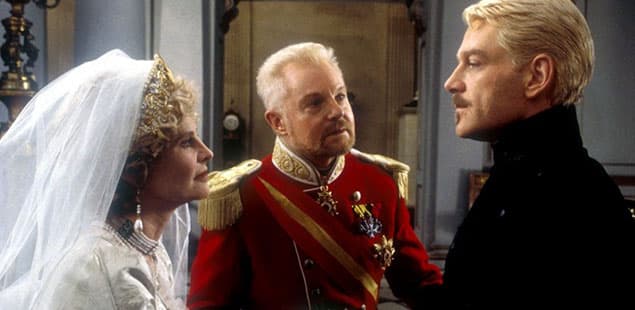Hamlet
Critique • Quotes • At the movies
1948, 1969, 1980, 1990, 1990, 1996, 2000
 Page from First Folio, 1623
Page from First Folio, 1623Written
1599–1601
First performed
1601 or 1602
First published
1603, in the First Quarto
Literary form
Play
Genres
Tragedy
Writing language
English
Author's country
England
Length
Five acts, 4,042 lines, approx. 29,000 words

Julie Christie as the queen and Derek Jacobi as the king try to reason with Kenneth Branagh's Hamlet.
The Modern Hamlet
Hamlet (1996): Also called William Shakespeare's Hamlet; director Kenneth Branagh; featuring Branagh, Kate Winslet, Julie Christie, Derek Jacobi, Gérard Depardieu
In 1996 was released the version that many have acclaimed the best yet, a match for Olivier's 1948 production. It performed modestly at the box office, however, perhaps due to its length.
The accomplished stage and film actor Kenneth Branagh both directed and starred in the four-hour film, which includes every line Shakespeare wrote for Hamlet. He also produced a two-and-a-half-hour version, which still seemed like too much Shakespeare for many viewers.
Too bad for them, as this Hamlet is fresh and exciting.
This production is also called William Shakespeare's Hamlet, though Branagh brings the time period up to the Victorian era. A real palace in England is used for interior scenes but it's dressed up with sparkling bright decor to match the colourful costumes of the cast—a startling and welcome contrast with the dour atmosphere of just about every other production of Hamlet you've ever seen.
Trailer for Kenneth Branagh's sumptous, reimagined Hamlet of 1996.
The supporting players are a mix of classical veterans (John Gieldgud who had been a famous stage Hamlet himself, Derek Jacobi at last playing his age as Claudius, and Judi Dench), young movie stars (Kate Winslet as Ophelia, Bill Crystal as a gravedigger, and Robin Williams as Osric), and aging movie stars (Gérard Depardieu, Julie Christie as Gertrude, Charlton Heston, and Jack Lemmon).
All the actors—even the comedians with little classical experience—do some of their best work in bringing to life and giving emotional depths to their characters.
The medium of film is used to make this Hamlet larger even than the Shakespearean play. For example, it dramatizes flashbacks exploring the past of characters in a way that stage presentations could not. The famous plays within the play are given their own filmic treatment. A lot of quick cutting is used to build the big dramatic moments similarly to how modern Hollywood films build a scene, rather than with long drawn-out, stationary shots featured in many films adapting classic material.
Lush, lavish and long, Branagh's Hamlet takes the most iconic play of all time out of the small, imaginative world of theatre and into the realm of larger-than-life epic movies.
— Eric

